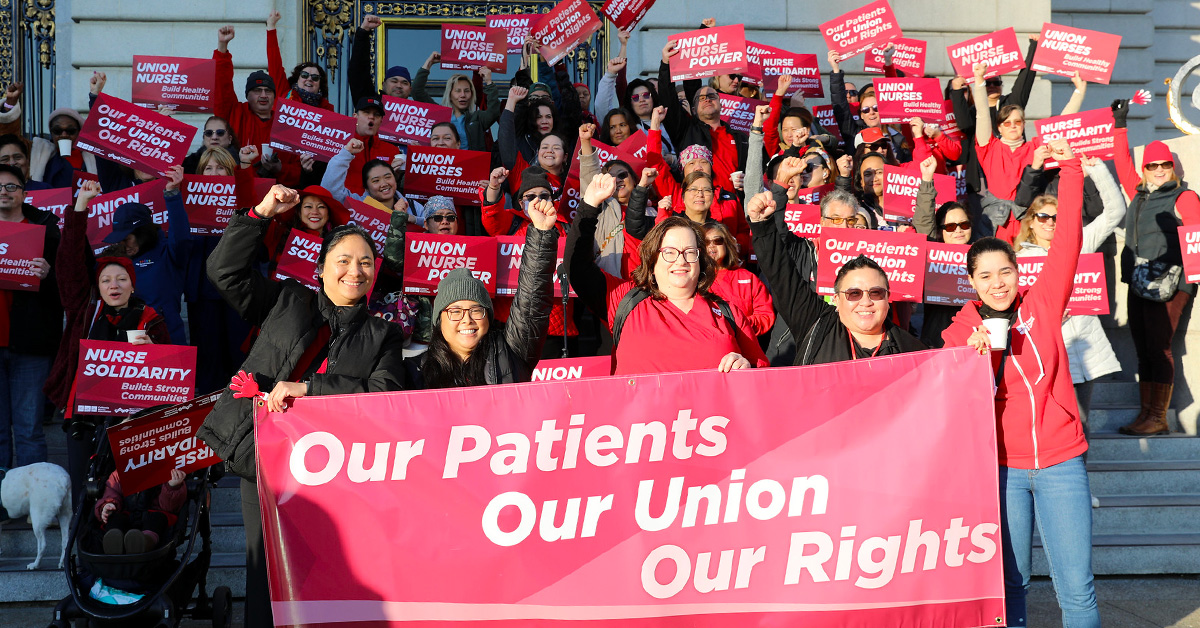Building Your Power

Engaging members is the key to a strong PPC
By Chuleenan Svetvilas
National Nurse magazine - Jan | Feb | March 2025 Issue
“Everyone should feel like they have a voice. Once you get members engaged, you can accomplish so much.”
That’s what Brenda Langford believes is key to developing a strong Professional Practice Committee (PPC). A registered nurse for nearly 30 years, Langford is a member of the PPC and the chief nurse representative at Chicago’s John H. Stroger Jr. Hospital of Cook County.
The elected nurse members of the PPC represent every major nursing unit and meet regularly to stay informed about what is happening hospital wide. It is an integral part of every contract negotiated by California Nurses Association/National Nurses Organizing Committee (CNA/NNOC). NNOC represents about 1,300 nurses in Cook County Health, including more than 800 nurses at Stroger. (Read about Stroger’s PPC in the October-November-December 2024 issue of the magazine.)
“The PPC works on escalating any unresolved issues to management at meetings,” said Deb Quinto Capistrano, an RN at Kaiser San Francisco who has attended PPC meetings for the past seven years, first as a PPC member and then as an inpatient quality liaison since 2020. “In PPC meetings, we hold management accountable. We track assignment despite objection forms (ADOs), discuss ADO trends or ADOs of concern.”
In addition to PPC meetings, Quinto Capistrano has attended other meetings, where management will be dismissive when nurses bring up their concerns or sometimes cancel the event. “We never canceled a PPC meeting — even during Covid,” noted Quinto Capistrano. “PPC members work to make recommendations to leadership to improve nursing practice and make it safe on the floor.”
The strength of the PPC depends on the engagement of its members and nurses. “If your PPC is new or is in a rebuilding phase, take the time to build your internal organizing power,” said Langford, an RN in integrated care at Stroger. “It all starts with a conversation. Outreach with each other. Start by building power in your unit. Develop leaders in each unit. You have strong leaders everywhere.”
Dahlia Tayag, RN at UC San Diego Medical Center (UCSD), agrees. “Communication is always key,” said Tayag, chief nurse representative and a PPC member at UCSD’s Hillcrest campus. “Offer yourself to help newer PPC members and be available if they need you so they don’t feel they are alone. We have to support each other and work as a group. Newer members may not have confidence to face management and fight. So we need to mentor each other.” (Read about UCSD’s PPC in the April-May-June 2024 issue.)
“Reach out to nurses you don’t know. Communicate with nurses to find out what they need, what’s important to each of them,” said Kerri Wilson, RN in the telemetry unit and PPC member since the nurses’ first contract ratification in 2021 at Mission Hospital in Asheville, N.C. “Find ways to let nurses know what the PPC has recommended to management. Then when changes do happen, nurses know the PPC was behind them.”
Wilson recommends getting nurse reps engaged and building other leaders so that no one is overwhelmed and nurses are sharing responsibilities.
“Get out there and talk to people, have constructive conversations,” advises Stacy Teal, RN and PPC chair at Providence St. Mary Medical Center in Apple Valley, Calif. “Be consistent and be brave enough to ask questions and talk to management. If something doesn’t feel right, ask, ‘What’s going on?’”
When a PPC is just getting started or is in a rebuilding phase, it is essential to have a commitment from everyone serving on the committee. Having paid time to attend PPC meetings makes it so much easier for the same people to show up month after month, noted Michael Kennedy, RN, PPC member and chief nurse rep at UCSD’s La Jolla campus.
“Consistency is important,” said Kennedy, a neurological ICU nurse. “We meet on the third Monday of every month. We have the same people participating time after time. We don’t have turnover. A lot of the wins made through the PPC have been long fights. It took us five years to get a dedicated RN transport team for the ICU. Now the hours have been expanded so we have a transport team from 10 a.m. to midnight. It is wildly successful.”
“Don’t get discouraged,” advised Kennedy. “Stick with it. Remember, if you don’t have the PPC to enforce your contract, your contract gains mean nothing.”